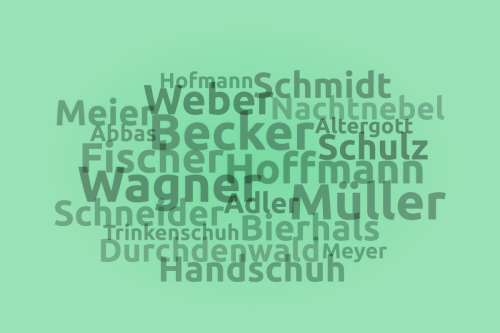In January 1871 Germany became a unified country. Until then, it was made up of smaller nation-states whose borders frequently changed. Even after 1871, Germany's land area and political influence shifted several times. Because of this, German last names can be found throughout bordering countries, including Poland, Austria, France, and Spain.
The Origin of German Last Names
It wasn’t until the Middle Ages (in approximately the 12th century) that family names came into common use. Initially, they were mainly a way of distinguishing between people more easily, and as settlements grew into villages, and later towns and cities, descriptions of professions such as tailor, miller, and cobbler/shoemaker were attached to people’s first names using the Latin word ‘dictus’ (‘called’) e.g. ‘Hans dictus Krier’ (‘Hans who is called a soldier.’)
These were then passed down through each generation. In Germany, these occupational names still form the largest group of German surnames. They include Schneider (tailor), Fischer (fisherman), and Weber (weaver). Many of these professions no longer exist but survive in naming traditions.
If doing ancestry searches, you should be aware that in some areas of Germany, such as Westfalen, Hannover, Lippe-Detmold, Oldenburg, and Schlesien, there are exceptions to the rule which make research more complicated. The last name could, for example, also be what you would call a farm name. If a German moved onto someone else's farm estate (or Hof), it was not uncommon to change his last name to that of the farm. If his wife inherited a farm, he might change his name to her maiden name. It’s thought that this system dates back to the time of Charlemagne.
The Most Common German Last Names (with English Translations)
The most common German surname is Müller (which translates as Miller). This is closely followed by Schmidt (which is associated with the blacksmith’s trade and can also be recognized in variations such as Schmitt or Schmitz). Schmidt is the most common surname in the central German-speaking and eastern low German-speaking areas. The third most popular last name is Meier (which derives from a term for a high-ranking farmer) and is very common in the low Geman-speaking areas.
- Becker - Baker.
- Fischer - Fisherman.
- Hoffmann / Hofmann - Courtier or steward.
- Meier or Meyer - Manorial landlord, or later, a self-employed farmer.
- Müller - Miller.
- Schmidt - Smith.
- Schneider - Tailor.
- Schulz - Sheriff (medieval).
- Wagner - Wainwright (maker & repairer of wagons).
- Weber - Weaver.
5 of the Most Unusual German Surnames (with English Translations)
Some of the following names can seem quite peculiar to non-German speakers, adding an extra layer of intrigue and uniqueness. This section aims to introduce a few of the most unusual German surnames and provide a glimpse into their fascinating origins and meanings.
- Bierhals - Beer-throat.
- Durchdenwald - Through-the-forest.
- Handschuh - Glove.
- Nachtnebel - Night fog.
- Trinkenschuh - Drink-shoe.
What Is the Most Popular German Last Name?
See if you can find your last name amongst these popular German surnames, plus learn about its meaning and origins!
- Abbas - This surname has Arabic origins and it means "lion" in English.
- Adler - This surname is German in origin and it translates to "eagle" in English.
- Altergott - "Alter" translates to "old" and "Gott" translates to "God" in English, making the meaning something along the lines of "Old God".
- Braun - This surname means "brown" in English.
- Frank - It could mean "free" or refer to someone from the Frankish Empire.
- Hoffmann - This surname suggests a steward or manager of the property, derived from Middle High German "hofman".
- Klein - This surname means "small" in English.
- Koch - This surname is an occupational name for a cook.
- Krüger - This surname is derived from the Middle Low German term "krūgære," meaning "potter" or "innkeeper."
- Lange - This surname means "long" in English. It could have been a nickname for a tall person.
- Neumann - This surname means "new man" in English.
- Schäfer - It's an occupational name for a shepherd.
- Schwarz - This surname means "black" in English.
- Wolf - This could have been a nickname for someone who resembled a wolf in some way, or it may have been used for someone who lived at a house with a sign of a wolf.
- Zimmermann - This surname is an occupational name for a carpenter, it translates to "carpenter" in English.

